Homeopathy and Mental Health Care: Integrative Practice, Principles and Research [#JOHHOM]
$49.96
Description
EVERY serious student or practitioner of homeopathy will want or need this book!
This timely, compelling, and useful book offers a comprehensive look at the integration of homeopathy and mental health care. Twenty-three leading healthcare professionals from around the world unite in a diverse collection of provocative, grounded and visionary, and clinically relevant chapters that offer the student, professional, and non-professional alike a clear and inspiring guide to the healing power and potential of homeopathy in mental health care.
Contributing authors: Hannah Albert, Philip Bailey, Iris Bell & Mary Koithan, Daniel Benor, Seema Bhat, Manish Bhatia, Kate Chatfield & Joy Duxbury, Jane Tara Cicchetti, Jane Ferris, Christopher Johannes, Corina Guethlin & Harald Walach, Peter Morrell, Joseph Rozencwajg, Kenneth Silvestri, Edward Shalts, Traian Stanciulescu, Ian Townsend, Judyth Reichenberg-Ullman & Robert Ullman and Harry van der Zee…with a Foreword by Dana Ullman
“At last a phenomenal anthology which should dispel forever the ignorance of those who refuse to accept the fact that homeopathy is effective! The bibliography of excellent studies on homeopathy alone makes this book a must for every health professional.”
Norman Shealy, MD, PhD, President Holos Institutes of Health
“The book is remarkable because it places homeopathy within the context of the current mental health system at precisely the point where it is needed. Reading this text makes it clear that homeopathy is an emerging medical science that holds tremendous potential for widespread application in the field of mental health. This work places the topic of homeopathy squarely in the middle of current mainstream medical research and clarifies what an integrative and balanced approach to mental health would look like. I highly recommend this work to my homeopathic, integrative and allopathic medical colleagues.” Ronald D. Whitmont, MD, New York Medical College
“This excellent book should interest all health care practitioners – even those with no interest in homeopathy. The careful yet pithy description of research into the benefits (and failings) of allopathic treatment of mental disorders provides ample food for thought. The book goes on to outline the general (and impressive) literature on homeopathy in randomized studies. But the heart of this important work lies in the insightful, comprehensive and truly integrative chapters by van der Zee, Johannes, Shalts, Bell, and others. Every chapter is worthy of study. The balanced approach taken by the authors and editors is reminiscent of the excellent earlier work of Dr. van der Zee – Miasms in Labour. I give this book my highest recommendation.”
Roger Morrison, MD, Hahnemann Medical Clinic
Table of Contents
Foreword by Dana Ullman, MPH
Section 1: Introduction
Chapter 1: Exploring the Role of Homeopathy in Reducing the Global Mental Health Burden
Dr. Manish Bhatia
1 Introduction
2 Status of global mental health
3 Where the elixir did not work!
3.1 Antidepressants
3.2 Selective serotonin reuptake inhibitors
3.3 Antipsychotics
3.4 Benzodiazepines
4 Homeopathy – a different approach
4.1 Use and prevalence
4.2 Underlying philosophy
4.3 Studying the psychological effects of medicines
4.4 Tracing the importance of mental health in homeopathy
4.5 Research evidence
4.5.1 General evidence for homeopathy
4.5.2 Efficacy in various diseases
4.5.2.1 Anxiety and depression
4.5.2.2 ADHD
4.5.2.3 Drug abuse
4.5.2.4 Insomnia
4.5.2.5 Stress
4.5.3 Improvement in co-morbidity
4.5.4 Improvement in general well-being, quality of life and patient satisfaction
4.5.5 Research on microdilutions
4.5.6 The safe choice
4.5.7 Cost-effectiveness
4.6 Challenges in homeopathic research & the road ahead
4.6.1 The research bias
4.6.2 The question of research methodology
5 Integration
6 Conclusion
Chapter 2 The Homeopathic Healing Process, Transformational Outcomes, and the Patient-Provider Relationship
Iris R. Bell, MD PhD MD(H) and Mary Koithan, RN PhD, USA
1 Overview of transformational change
2 Transformation in healthcare and homeopathy
2.1 Case examples
2.2 The multidimensional nature of patient outcomes in homeopathic treatment: inclusion of the physical domain in transformation
2.3 The role of the patient-provider relationship in homeopathic care and transformative outcomes
3 Conclusions
Chapter 3 Wholistic, Spiritual Aspects of Homeopathy
Daniel J. Benor, MD ABIHM, Canada
1 Spirituality
2 Holistic healing
3 Homeopathy as a holistic practice that includes spirituality
3.1 Imponderable/meditative/symbolic/metaphoric remedies
3.2 Homeopathic remedies as radionics treatments
3.3 Holistic evidence from other complementary/alternative therapies
3.4 Mental projection of homeopathic remedies
3.5 Theories to explain spiritual aspects of homeopathy
3.6 Contributions of holistic, spiritual awareness in homeopathy
4 In Summary
Chapter 4 Was Hahnemann the Real Pioneer of Psychiatry?
Peter Morrell, BSc MPhil PGCE, United Kingdom
1 Introduction
1.1 Johann Christian Reil (1759-1813)
1.2 Philippe Pinel (1745-1826)
1.3 William Tuke (1732-1822)
2 Treatment of Klockenbring
3 In the Organon, Hahnemann on so-called ‘mental diseases’
4 Discussion
4.1 Vitalist predecessors
Section 2: Integration, Case Applications, and Therapeutic Process
Chapter 5 Homeopathic Treatment of Children with Behavioural and Learning Problems
Judyth Reichenberg-Ullman, ND DHANP LCSW & Robert Ullman, ND DHANP, USA
1 Overview of clinical experience
2 Why homeopathic treatment?
3 Homeopathic treatment
3.1 Case taking
3.2 Case analysis
3.3 Homeopathic prescription and case management
3.4 Course of treatment
4 Illustrative cases
4.1 Case a thirteen-year-old-boy with oppositional-defiant disorder
4.2 An interesting teaching case: finding the simillimum
4.3 Case: a fascination with blood and gore
4.4 Case of a perfectionistic child with attention deficit disorder
5 What to expect from homeopathic care
Chapter 6 Homeopathic Treatment of Multiple Personality Disorder
Dr Philip M. Bailey, MbBs MFHom DipHyp, Australia
1 Introduction
2 Multiple Personality Disorder
3 Case examples
3.1 Wendy
3.1.1 Mandragora (Mandrake root)
3.1.2 Follow-up
3.2 Sabine
3.2.1 Follow-up
3.3 Diedre
3.3.1 Boron
3.3.2 Follow-up
4 Conclusion
Chapter 7 Homeopathic Treatment for Post-Traumatic Stress Disorder
Edward Shalts, MD DHt ABPN ABHT ABHM, USA
1 Introduction
2 History of PTSD
3 Official criteria for PTSD
4 Types of PTSD
5 Examples of traumas that can lead to PTSD or acute stress disorder
6 Conventional treatments for PTSD and acute stress disorder
7 Homeopathic approach to PTSD
7.1 Main principles of homeopathic approach to treatment of PTSD
7.1.1 Acute stress disorder
7.1.2 Acute and delayed onset PTSD
7.1.3 Homeopathic approach to PTSD in children
7.1.3.1 Case of Mancinella
8 Conclusion
Chapter 8 Healing Collective Trauma with Homeopathy: Applying the Genus Epidemicus Approach to Trauma
Harry E. van der Zee, MD Hom, Netherlands
1 Introduction
2 The principles of homeopathy
3 As if one person
4 Miasms
4.1 Infectious diseases and miasms
4.2 Miasms and process
4.3 The logic of miasms
4.4 A new source
5 Collective trauma
5.1 Genocide in Rwanda
5.2 Second-generation Holocaust trauma: case of a 55-year-old woman with a deep pain
5.3 Trauma and miasm
5.4 The trauma of war in Africa
5.5 The trauma of rape in Africa
5.5.1 A case of rape and gonorrhoea
5.5.2 The raped women of Bukavu
6 Conclusion
6.1 Follow the river to its source
6.2 Impossible?
Chapter 9 Homeopathic Prescribing Strategy for Patients Taking Psychotropic Medications
Edward Shalts, MD DHt ABPN ABHT ABHM, USA
1 Introduction
2 Management of conventional medications
3 How to administer homeopathic remedies to patients on conventional medication
4 Role of illicit drugs in treatment of mental illness
5 Conclusion
Chapter 10 The Homeopathic Counsellor: Beyond the Remedy
Christopher K. Johannes, PhD, DHM HD(RHom) MA H NCC LPC LMHC, Japan
1 Homeopathy’s underutilized role in mental health care
2 The idea of the homeopathic counsellor
2.1 Something more: mental health benefits beyond the remedy
2.2 Even more: integrated mind-body-spirit health
3 Do we need a recognized homeopathic counsellor?
4 Ideas into action
Chapter 11 From Unprejudiced Observer to Narrative Facilitator: Rogers’ Person-Centred Approach and the Homeopathic Consultation
Ian Townsend MA RSHom, United Kingdom
1 Introduction
2 Rogers’ PCA model
2.1 Rogers’ six conditions2.11. Making psychological contact
2.1.2 Vulnerable client, resourceful practitioner
2.1.3 Core condition 1: unconditional positive regard (UPR)
2.1.4 Core condition 2: empathy
2.1.5 Core condition 3: congruence
2.1.6 Communication: client awareness
2.2 Putting it all together: the idea of single configuration
Summary
Chapter 12 Integrating Psychotherapy and Homeopathy: A means of determining the needs of the vital force
Kenneth Silvestri, EdD CCH RSHom (NA), USA
1 Introduction
2 The ingredients to integrate homeopathy and psychotherapy
2.1 Celebrating interpersonal communication
2.1.1 Implications
2.2 Understanding context and systemic treatment
2.2.1 Implications
2.3 Explore psychology
2.4 Mindfulness, forgiveness, and health
2.4.1 Selected “forgiveness remedies”
2.4.2 Implications
2.5 Respect constitution and temperament
2.5.1 Implications
2.6 Allow collective connections
2.6.1 Implications
3 Genogram format (McGoldrick, 1995) and case example
3.1 Implications
3.2 Case example
4 Conclusion
Chapter 13 Unlocking the Door to Human Potential – A Jungian Perspective on the Treatment of Emotional Disorders with Homeopathy
Jane Tara Cicchetti, RSHom(NA) CCH, USA
1 Introduction
2 An early childhood dream
2.1 Case analysis
2.2 Follow-up
3 Conclusion
Chapter 14 Homeopathy as a Tool for Personal Evolution
Hannah Albert, ND, USA
1 Introduction
2 Methodology
2.1 What I seek in the interview
2.2 What happens with treatment
3 Case study
3.1 Assessment
3.2 About miasms
3.3 Homeopathic prescribing
3.4 Follow-up
4 Conclusion
Chapter 15 Treatment of Mental Diseases, a Clinical Diary
Dr. Seema, BHMS MD Hom, India
Introduction
Excerpts from the case diary
Conclusion
Chapter 16 Using the Tools of Traditional Chinese Medicine Diagnosis to Prescribe Homeopathic Remedies in Psychological Cases
Dr. Joseph Rozencwajg, MD PhD NMD, New Zealand
1 Introduction
2 Yin and Yang
3 The five elements
4 The seven emotions as causes of disease and their relations to organs/functions
5 Tongue diagnosis
6 Pulse diagnosis
7 Some remedies
8 Conclusion
Section 3: Research, Ethics, and Theory
Chapter 17 Is Homeopathy Useful in Psychotherapy?
Jane A. Ferris, PhD, USA
1 Introduction
2 The research
2.1 Observations
2.2 Alchemical process: impact of research
3 Conclusions
Chapter 18 Research Issues in Homeopathy in Mental Health
Corina Güthlin, PhD, Germany & Harald Walach, PhD, United Kingdom
1 Introduction
2 Research in homeopathy
2.1 Research in homeopathy and mental health care
2.1.1 Basic research
2.1.2 Systematic reviews and randomized controlled studies
2.1.2.1 Randomized controlled trial in depression and anxiety < p>
2.1.2.2 Randomized controlled trial in chronic fatigue syndrome
2.1.2.3 Randomized double-blind placebo-controlled crossover trial in attention deficit hyperactivity syndrome
2.1.2.4 Randomized controlled double-blind pilot study on premenstrual syndrome
2.1.3 Varies other types of studies
2.2 A practical guide to research
3 Conclusion
Chapter 19 Ethical and Practical Implications for Homeopaths in Mental Health Care
Kate Chatfield, MSc RSHom & Joy Duxbury, PhD, United Kingdom
1 Introduction
2 Ethics in medicine
2.1 Respect for Autonomy
2.2 Beneficence
2.3 Non-maleficence
2.4 Justice
3 Ethics in treatment of people with mental health problems
4 The survey
Chapter 20 Neuro-Psychical (Dis)Orders and Homeopathy: Biophotonic Connections
Prof. Dr. Traian D. Stãnciulescu, Romania
1 Instead of an introduction: towards a (meta)physical synergy
2 Fundamentals of biophotonics: a necessary synthesis
2.1 Theoretical roots of healing by light
2.2 The model of hierarchical energy-information traps: on the genesis of the profound resources of human health
3 Neuro-psychical (dis)orders: a biophotonic approach 3.1 Neuro-mental mechanisms of human health
3.2 Neuro-mental illness: biophotonic connotations
4 Homeopathic therapy for neuro-psychic disorders: the integrative assumption of biophotonics
4.1 On the mechanism of resonance by light: “similia similibus curentur”
4.2 The homeopathic mechanism of neuro-psychic therapy: the release by resonance of energy-information traps
5 Summary of a healing process and practical implications
About the Authors
Index of Remedies
Index
REVIEW:
Reviewed by Ronald D. Whitmont, MD, USA
Johannes’ and van der Zee’s compilation entitled “Homeopathy and Mental Health Care” is an impressive and well researched text. What marks the difference in this work is the effort that has been made to locate the benefits of homeopathy within the evidence base of current medical and scientific knowledge.
The authors of this book have explored the use of homeopathy in mental illness within the context of the current global crisis in mental health care. These chapters clearly and concisely delineate the remarkable achievements of homeopathy in stark contrast to the current, ailing system of medicine. The book brings together evidence supporting the advantages of homeopathy while demonstrating how it can be integrated into mainstream psychological approaches.
The book is remarkable because it places homeopathy within the context of the current mental health system at precisely the point where it is needed. This is indeed a scholarly work that should be widely read both by homeopaths and integrative practitioners alike. The book helps bridge the gap between practitioners of somatic based therapeutics with those who practice only psychologically based therapies.
This book will allow homeopathic practitioners to gain tremendous insight into the mainstream context of what they do, while integrative and allopathic practitioners stand to gain from the scholarly, evidence-based presentation of homeopathy as it relates to the care and treatment of mental and psychological conditions. The sections dealing with research in homeopathy are remarkable for careful citations and well-referenced information on the current state-of-the-art of ongoing homeopathic medical research. Homeopathy is discussed frankly and coherently.
Reading this text makes it clear that homeopathy is an emerging medical science that holds tremendous potential for widespread application in the field of mental health. This work places the topic of homeopathy squarely in the middle of current mainstream medical research and clarifies the position that an integrative and balanced approach to mental health would look like. The book forces us to go beyond our current addiction to psychotropic medications and to consider therapies that may cure rather than palliate. The text is consistently well-referenced, bridging some of the most current scientific data with homeopathic methodology and treatment.
This book should act as a template for future books on the benefits of homeopathy in a vast array of medical conditions. The 23 contributing authors from 11 different countries to this anthology are: Hannah Albert, Philip Bailey, Iris Bell & Mary Koithan, Daniel Benor, Seema Bhat, Manish Bhatia, Kate Chatfield & Joy Duxbury, Jane Tara Cicchetti, Jane Ferris, Christopher Johannes, Corina Guethlin & Harald Walach, Peter Morrell, Joseph Rozencwajg, Kenneth Silvestri, Edward Shalts, Traian Stanciulescu, Ian Townsend, Judyth Reichenberg-Ullman & Robert Ullman and Harry van der Zee.
I highly recommend this work to my homeopathic, integrative and allopathic medical colleagues.

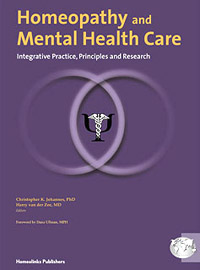
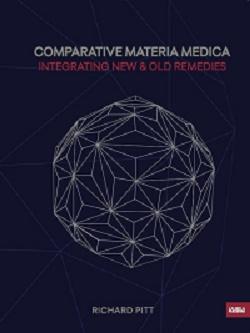
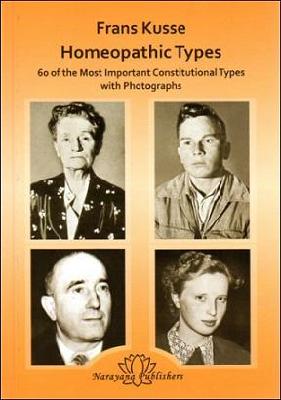
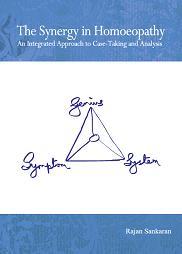
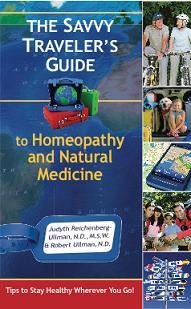
Reviews
There are no reviews yet.